The Empresses of Constantinople - Author: Joseph McCabe
The long and prosperous reign of Basil II. (976–1025) has no further interest for us, since we find in the chronicles no reference to a wife of that hardy and brilliant soldier. His younger brother, Constantine, was more like their mother: a man of passion and greed, though with no higher ambition than that of an imperial enjoyment of wine and women, and in that enjoyment he was quite willing to await the natural death of his more sober and more distinguished brother. Although he approached his seventieth year when the undivided rule fell to him, his ways were still those of an aged and jaded, and not very refined, Sybarite, and the three years of his reign interest us only because they show us the earlier environment of his two daughters, Zoe and Theodora, who are the next to occupy—alternately or simultaneously, according to the course of the romance—the gynæceum, or women’s quarters, of the palace.
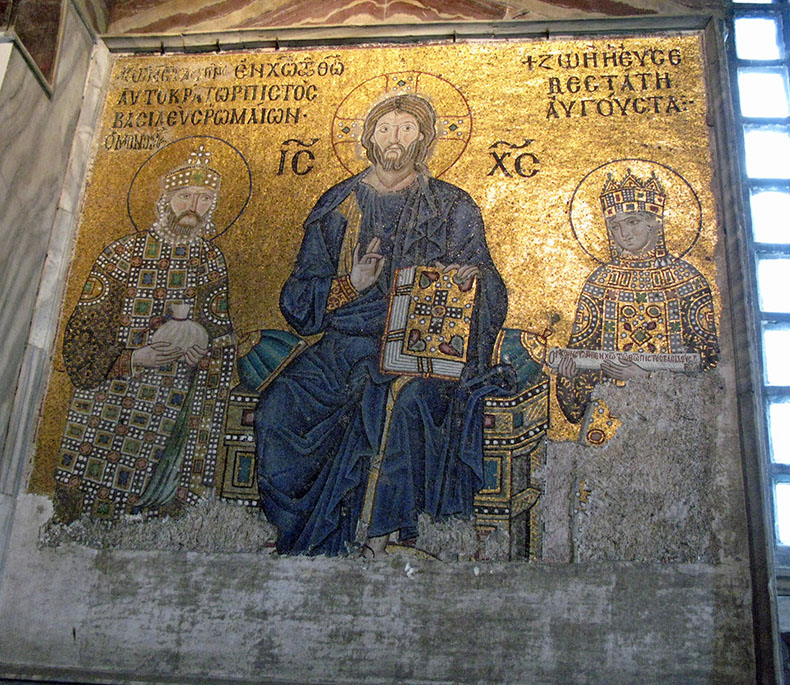 Constantine’s wife, Helena, daughter of the patrician Alypius, is a mere cipher in the imperial records, and seems to have died much earlier, leaving three daughters—Eudocia, Zoe and Theodora—to grow up as they might in the palace of her voluptuous husband. Eudocia, the eldest, lost during an attack of smallpox whatever comeliness she may have had, and retired to hide her disfigured countenance under the veil of a nun. There remained Zoe and Theodora, and Constantine determined to marry one of the two to some important noble and leave the crown to him. The elder of the two was nearly fifty years old, and Theodora cannot have been much159 younger. It is not very clear why they had not married earlier. Their father, who could hardly be induced to take the least interest in his Empire, had wholly neglected his daughters until he held the sceptre in his hands, and felt that the time was at hand when he must relinquish it to another. He was a very large and robust man, absorbed in hunting, gambling and other less reputable pleasures, and, even when he was sole Emperor, he left the cares of state to his eunuchs and retained his imperial attention for the theatre, the banquet and the dance. In his home the sisters had, says the chronicler, “lived as they listed,” and the further course of the story will make it probable that Zoe had not failed to enjoy her liberty. Theodora was less sensual, but we shall have to include both sisters in the list of Empresses who were little embarrassed by moral scruples.
Constantine’s wife, Helena, daughter of the patrician Alypius, is a mere cipher in the imperial records, and seems to have died much earlier, leaving three daughters—Eudocia, Zoe and Theodora—to grow up as they might in the palace of her voluptuous husband. Eudocia, the eldest, lost during an attack of smallpox whatever comeliness she may have had, and retired to hide her disfigured countenance under the veil of a nun. There remained Zoe and Theodora, and Constantine determined to marry one of the two to some important noble and leave the crown to him. The elder of the two was nearly fifty years old, and Theodora cannot have been much159 younger. It is not very clear why they had not married earlier. Their father, who could hardly be induced to take the least interest in his Empire, had wholly neglected his daughters until he held the sceptre in his hands, and felt that the time was at hand when he must relinquish it to another. He was a very large and robust man, absorbed in hunting, gambling and other less reputable pleasures, and, even when he was sole Emperor, he left the cares of state to his eunuchs and retained his imperial attention for the theatre, the banquet and the dance. In his home the sisters had, says the chronicler, “lived as they listed,” and the further course of the story will make it probable that Zoe had not failed to enjoy her liberty. Theodora was less sensual, but we shall have to include both sisters in the list of Empresses who were little embarrassed by moral scruples.
In approaching their careers we have the rare advantage of an excellent guide. Michael Psellus, one of the leading philosophers and literary men of Byzantine history, not only lived at their Court, and knew them intimately, but he had a genial taste for the tattle and scandal of a court and not the least reluctance to entrust it to his graceful pen. He has been called the Voltaire of Byzantine letters on account of his brilliant, caustic and very candid way of writing the story of his times. We shall find his “Chronography” of inestimable value, provided we make due allowance for the prejudices of the politician and the amiable unscrupulousness of the anecdotist.
Zoe and Theodora were very different types of women. Zoe, who will interest us most, was a woman of fine complexion, very graceful figure and ardent passions. She had large sensuous eyes under heavy eyebrows, a mass of blonde hair, and a skin of remarkable whiteness. She was of middle height, and preferred to dress in simple robes, which exhibited her figure, rather than in the heavy and gorgeous draperies and massive jewellery160 of an Empress; though this simplicity of taste was limited, on one side, by a passion for perfumes and cosmetics, of which she gathered the material from all parts of the world and compounded, either with her own hands or by her maids, so industriously that her room “looked like a workshop.” She took such care of her smooth and clear skin and blonde hair that even in her seventieth year she had no wrinkle or other mark of age. She retained youth also in her blood, and we shall find her remarkably amorous in her sixth decade of life. Such a woman we shall hardly expect to find richly endowed with intellect or greatly restrained by moral sentiments, yet I think that M. Diehl follows too literally the facile witticism of Psellus when he speaks of Zoe as “childish” and “silly,” and I will prefer to let the story of her life tell us the limitations of her intelligence and character.
Theodora will interest us much less than Zoe, and it will suffice to say that she was in all respects different from her sister. Her tall and graceless figure and her very plain features were compensated by a stronger intelligence and greater force of character. She could be coldly stern, even cruel, on occasions, while cruelty only came to Zoe in the impulsive anger of her thwarted passions. We shall see that, when the occasion came to her, she cherished a very high ideal of public duty and used her power with an intelligence and beneficence that Psellus greatly underrates.
Such were the two daughters who, in middle age, were warned by their father that one of them must marry and inherit the Empire. The choice of Constantine first fell upon a distinguished noble named Constantine Delassenus, and a eunuch was sent to bring him from Armenia, where duty had taken him, to the Court. Much tragedy might have been prevented if that eunuch had reached his destination in time, but he was recalled by a second courier and told that the Emperor had changed his mind. It appears that the commander of the palace guards had161 felt that he would not have much influence on a noble like Delassenus, and he had brought to the notice of the Emperor a less young and less vigorous candidate, Romanus Argyrus, who was related to Constantine. Romanus was sixty years old, and had little to recommend him except his incompetency, which would suit the designs of the officers of the Court. He had, however, a wife living in Constantinople at the time, and it seems to have been supposed that he might not be willing to abandon her. The petty schemers of the Court were accordingly directed to bring about a separation, and, as Polyeuctes was dead, and a more accommodating patriarch held the see, no opposition was expected from the Church.
A file of soldiers entered the mansion of Romanus and told him that he had incurred the anger of the Emperor. They were, they said, to lead him to the palace for execution, and his wife was to enter a monastery. Many eyes had been put out, on slight grounds, during the three years’ licentious reign of Constantine, and the threat was serious. The wife fled at once to a monastery, and Romanus was brought, in some trepidation, to the royal presence—to learn that, since his wife was now a nun, he was free to marry the Emperor’s daughter and thus secure the purple. Instead of retiring to thrust a dagger in his heart, as an older Roman would probably have done, the sixty-year-old noble graciously submitted his person to the princesses. Theodora, the favourite of her father, had the first choice, but she turned away in disgust. Possibly Romanus did not regret that this gave him the hand of the more charming Zoe, who, in her forty-ninth year, fully preserved the fresh and brilliant complexion and the warm passions of a young woman. He had set out from home prepared for death, and must have been bewildered by his fortune. The clergy obligingly disentangled the somewhat complicated relation in which they stood to each other, in the eyes of the Church; they were married and crowned on 19th162 November 1028; and, as Constantine died three or four days afterwards, the duty, or pleasure, of governing the Empire fell on them during the first week of their singular honeymoon.
After this inauspicious beginning we shall hardly expect the reign of Romanus III. and Zoe to be one of brilliant and inspiring deeds; indeed, we may say briefly that it was merely an inglorious effort to retain the crowns they had obtained. They adopted the easy device of emptying the treasury on the common folk, the clergy and the monks. The private debts of citizens were paid by them, more churches were built or richly decorated, the clergy were relieved from taxation, and the monks—it was the very culmination of their golden age—were lodged in luxurious mansions which made their calling one of the most attractive in the Empire. The graver nobles frowned, plotted and were savagely punished, but we are interested in these conspiracies only in so far as they involve the imperial sisters.
Theodora, a spirited and intelligent woman, naturally despised the marriage which she had refused, and was regarded with suspicion and hatred by her sister. By some means Zoe put at the head of Theodora’s household a Paphlagonian eunuch in her own pay, a very crafty and unscrupulous man named John, who was enjoined to watch Theodora’s conduct. This very interesting person will be better known to us presently, as he was destined to be the most powerful man in Zoe’s Court. For the moment it is enough to say that, about a year after the coronation, Theodora was discovered to have some share in a conspiracy which was set afoot by Constantine, a relative of the Emperor. It is curious that John also was found guilty, though whether this was merely a trick to conceal his spying, or he had really been gained by Theodora, it would be difficult to say. Theodora was expelled from the palace and confined in a building at Petrion, on the Golden Horn, which seems to have had the mixed characters of a monastery, a state163 prison and a fort. It was the building to which Nicephorus had consigned Theophano for a few weeks before their marriage, and would have comfortable apartments. A year later Romanus was ignominiously beaten by the Saracens and the conspiracy revived. There is no proof that Theodora took part in it, but its aim would be, no doubt, to place her on the throne. In one of those moments of energy which passion occasionally gave her, Zoe went to Petrion, and forced her royal sister to take the vows and adopt the dress of a nun.
As a number of other malcontents lost their eyes or their liberty at the same time, the throne of Zoe and Romanus seemed to be firmly established. Unfortunately, a very grave breach now took place between the imperial pair, and, as a handsome official entered the service of the palace, there happened what so commonly happens in Byzantine history under the circumstances: Zoe fell in love with the handsome servant, and Romanus died, of a mysterious complaint.
Delicacy compels me to refer the inquisitive reader to the Greek text of Psellus, or to the chronicle of the monk Zonaras, for a full explanation of the rift in the sacred palace. Briefly, Romanus had been assured by one of those soothsayers who were in such high repute at Constantinople that he would have a son, and he zealously studied and employed the whole known range of aphrodisiacs and other contrivances that might help to ensure the fulfilment of the prophecy. After two or three years of this peculiar activity he retired in despair from the struggle, leaving Zoe untouched and indignant. As she had now certainly entered her sixth decade of life, the modern reader will have but a slender sympathy with her, and will recognize a very low quality of character in her conduct. Her husband became ill, and his favourite chamberlain, Michael, was often summoned to attend him, even when Zoe shared his bed. This chamberlain was a tall, handsome, fresh-faced young man, whose form pleased the Empress, but there was a deeper intrigue in the affair; the164 chamberlain was a brother of the Paphlagonian eunuch John, whom we saw in charge of Theodora’s mansion, and it is now necessary to present him more intelligibly.
John was a very shrewd, ambitious, vulpine provincial of mean family; he had been converted into a eunuch in early years, had held office in the employment of the Emperor Basil, and had then retired to a monastery. His character is so far removed from religious ideals that one is disposed to imagine him as having been compelled to take the black robe for some indiscretion, but it is quite possible that he adopted it voluntarily, as at this time many of the monasteries were merely luxurious colonies of bachelors living on a swollen stream of legacies. Romanus, who knew his ability, brought him from his monastery to supervise Theodora and her affairs. In spite of the curious statement that he was himself involved in the conspiracy, he was soon back at Court, and in great favour. He had five brothers and a sister, and the general character of the family may be deduced from the fact that three of the six brothers were moneylenders, two (John and Simeon) were monks, while the sister, Maria, had married a ship-caulker at the quays. John used his influence to introduce these brothers into the very lucrative service of the State. Within a few years the beau of the family became Emperor, the son of the ship-caulker also became Emperor, the ship-caulker himself became High Admiral of the Fleet, two other brothers had the rank of generals, and John became the virtual ruler of the Empire.
It was chiefly through his young and attractive-looking brother that John pushed their fortunes. Michael was a young man of large and well-proportioned figure, with that freshness of complexion which we often find in nerve-diseased or epileptic subjects. He became a favourite chamberlain of Romanus, and John presently noticed that Zoe was interested in him. Romanus was visibly failing, and Michael was at times called in to chafe his feet as he lay in bed with Zoe. “Who will165 believe,” the monk Zonaras asks, “that he did not take the opportunity to rub Zoe’s feet also?” Zoe expressed to John a lively interest in his brother, and John took care that their movements should not be hampered by any of the restrictions that normally curtailed the liberty of a Byzantine Empress. The pale Paphlagonian, in the black dress of a monk, was already the supreme master of the palace, but the most piquant feature of his position is to find him chiding the nervous hesitation of his brother and feeding the improper admiration of the Empress.
Psellus dilates, almost gloats, for pages over the development of this singular love story, in a way that hardly becomes a great exponent of Plato and Aristotle. Before long the relation of the two was known to the whole Court. Michael was loaded with jewels and other presents, and not infrequently courtiers would find him sitting, still rather nervously, on the same couch with the infatuated Empress. One day a servant entered the throne-room for some purpose, and almost fell to the ground in astonishment. Zoe had made Michael sit on the throne, had put the crown on his head and the sceptre in his hand, and was admiringly murmuring: “My darling, my flower of beauty, joy of my eyes, consoler of my soul,” etc. Instead of bursting into passion at the entrance of the official, she bade him do homage to the man who would one day be his Emperor. So says, at least, the philosophic Psellus, whom many believe. It is quite certain that Zoe made flagrant love to the chamberlain, and that the Emperor knew it. His sister, Pulcheria, angrily spoke to him of the notorious scandal, but he professed to be ignorant of it and was content to exact from Michael an oath that there was no truth in the rumour. Other writers say that he overlooked the liaison because it preserved his middle-aged spouse from promiscuous irregularity.
Romanus forgot that such love affairs were apt to entail tragic consequences for the superfluous man. As Zoe’s passion increased, he found himself suffering from166 an alarming and mysterious illness. His hair fell out in patches, his breathing was laboured, his face—a more significant symptom in an old man like Romanus—became livid and puffy. Whether this illness was really due to a slow poison, and whether the poison was administered by John or Zoe, are points which we must leave as we find them in the chronicles—uncertain. Since there is very little doubt that Romanus was murdered in the end, the theory of poison is not reckless; but Romanus was aged and worn, and the illness may have been natural. However that may be, Romanus lingered in a frightful condition until Holy Thursday of the year 1041. On that sacred day Romanus distributed to the Senators the ceremonious gifts prescribed in the ritual, and retired to the bath. From the bath he was presently removed in a dying condition to his bed. However possible it may be that he had had a serious attack of his illness in the bath, we cannot easily ignore the persistent statement that men entered the bathroom, and either strangled the Emperor or held his head under the water. Psellus gives this as a rumour, but even he seems to believe it. Both Michael and John are accused of the murder, and it is left uncertain whether Zoe was privy to the plot. Her immediate conduct will not dispose us to be eager to clear her memory of the suspicion, but we may be sure that the monk John was the soul of the plot.
Zoe came, with ostentatious (the chronicler says feigned) tears, to see that her husband was really dead or dying, though she did not await the end, which occurred soon afterwards. When we learn that she announced her intention of marrying Michael the same evening we are disposed to see in her an element of cold-blooded calculation which does not very well assort with the character we have given her. It would probably be much more correct to conceive her as nervous and confused, and simply yielding to the dictation of the monk John. Her father’s eunuchs, who had remained in her service, begged her to wait some time,167 but John bullied and threatened, and Michael was forthwith decked in the dead man’s robes and placed beside Zoe in the gold-roofed hall. The patriarch was summoned to the palace and curtly ordered to crown Michael and marry him at once to the very recent widow, in the presence of the assembled Senators. The whole scene is so repulsive that we need not hesitate to accept the last touch given to it in the chronicles. The archbishop hesitated, but a present of a hundred pounds in gold from John removed his scruples, and he invoked the blessing of God on the new imperial marriage.
After this authentic episode it is superfluous to seek to determine the share of Zoe in the illness and death of her first husband. The monk-eunuch was capable of any crime, and it is, perhaps, not likely that he would take others into his confidence in perpetrating them. His brother Michael was a feeble-minded man, of no criminal instincts, whom we shall presently find smitten with the deepest remorse for the part he had played. Zoe also was little more than a tool in the hands of John. Had he communicated his criminal design to them, they would probably have consented, but there is no evidence that he did so. The marriage, however, is a sordid fact that no casuistry can excuse. It would, no doubt, be represented to Zoe that delay would give an opportunity for a revolution, and there were always at Constantinople nobles who were ready to aspire to the throne when so excellent a pretext was afforded. These considerations may explain, but cannot excuse, Zoe’s action. She was almost, if not quite, devoid of moral feeling. The utmost we can say for her is that it was not merely her passion for Michael that gave such indecent precipitancy to a woman of fifty-four years. But she had no children to protect, and she lent herself to this disgraceful procedure merely in order to retain her royal position.
We read, therefore, without the least sympathy that, while the change made the fortune of the astute John and his brethren, it brought great disappointment and168 chagrin to Zoe. She had, the chronicler says, imagined that the lowly chamberlain, grateful for his elevation to the throne, would be her slave, and she at once gathered about her the former servants of her father and began to rule. But the monk had no intention of handing to her the power he had purchased so heavily. His official position was merely that of “orphanotrophos,” or director of charitable institutions; his real position was that of Emperor. Most of the brothers were able men, but Michael was, as John probably took into account from the first, epileptic and incapable of self-assertion. John, therefore, took the reins in his own hands. He summarily dismissed Zoe’s eunuchs and maids and put about her an army of servants in his own employment, so that she could not even go to the bath without the permission and knowledge of the eunuch. To the Empire and its affairs, it may be said, he devoted the most careful and intelligent attention. Even in the midst of a solitary carouse—for the monk was fond of wine—he would turn with alacrity to any pressing business. It was only in the dishonest enrichment of himself and his brothers, whom he at once promoted to the highest commands, that he overreached himself.
One noble only, the Constantine Delassenus who had so narrowly missed the Empire and the hand of Zoe, rebelled against this division of the Empire among a family of low-born eunuchs and money-changers, and the punishment of Delassenus so well illustrates the world in which Zoe now found herself that it may be briefly recounted. John secured the loyalty of the Senators by a generous distribution of money, and then sent a eunuch to assure Delassenus, who was in Armenia, that his conduct would be overlooked if he disarmed at once. Delassenus required some tremendous security of such a promise on the part of John, and it was left to the clergy to devise a new and particularly ponderous oath. The evolution of the oath in Byzantine life is one of the many ways in which we may trace the169 degradation of its character; no one had any longer the faintest confidence in oaths on the true cross or the Sacrament. A group of clerics were therefore sent with the most sacred objects in the reliquaries of Constantinople, and they marshalled before the eyes of Delassenus the cross, the napkin bearing a miraculous image of Christ, the original letter of Christ to King Abgar, and the portrait of Mary painted by St Luke. On these portentous relics an oath was taken that no punishment would be inflicted on him. He submitted; and a few months later, when the people of Antioch rose against their oppressive tax-gatherers, the revolt was subtly traced to the distant noble, and he was exiled and ruined.
Zoe tolerated the domination of the odious monk for a few years impatiently, and at length made an attempt on his life. She won one of the eunuchs whom John had placed about her, and directed him to offer John’s medical attendant a vast sum of money if he would poison his master. But, by one of those convenient accidents which commonly happen in novels and in Byzantine history, the doctor’s boy discovered the plot and denounced it to John. Her eunuch was drastically punished, and Zoe was treated worse than ever.
At the same time her condition became more unpleasant, because Michael’s illness became worse. The popular belief in Constantinople was that a devil had invaded the Emperor, to punish him for his mendacious denial, to Romanus, of intimacy with Zoe. Men told of the suddenness with which the quiet, rosy-cheeked Emperor would be, at any moment, converted into a frothing maniac, and it was noticed that, on the rare occasions on which he appeared on the throne, purple curtains were looped in readiness about it, and servants stood to draw them round the throne if the devil should choose that moment to indulge his frolics. Even the Byzantine writers take this theory seriously; though some of them offer the alternative theory of insanity. We recognize the symptoms of epilepsy, and see that170 Zoe’s choice had failed. Between the attacks Michael, who seems to have believed in the devil, was gloomy and penitent. He and his brothers walked barefoot through the city, at the head of processions, bearing the swaddling-clothes of the infant Christ and all the other priceless relics I have mentioned; but the only answer of the heavens was a storm of such hail that the stones crashed through the tiled roofs. He visited shrines, built churches and monasteries, showered gold on the clergy, and even gave a baptism-fee to every new-born babe; and famine, pestilence and earthquake vexed the over-burdened Empire, and men cursed Michael and his brothers.
At length dropsy was added to epilepsy, and Michael determined to resign and enter a monastery. Zoe seems by this time to have been completely cowed by the arrogant monk, and she made little opposition when he went on to provide a new and strange aspirant to the throne. His sister Maria was, as I said, married to a ship-caulker named Stephen, who had been put in command of the fleet. They had a boy named Michael, a vicious youth, but young enough to submit to his uncle’s rule if he obtained the crown, and the Emperor and Zoe were persuaded or coerced to adopt this child and clothe him with the dignity of Cæsar. One of the chroniclers tells that they deceived Zoe by representing the boy as the son of a noble matron. Some such fiction may have been served to the populace, but Zoe could hardly be deceived on the point; and even the people were not long deceived, if at all, since he has passed into history as Michael the Caulker. In the chapel at Blachernæ the boy was accepted into the imperial family, after swearing the customary ponderous oaths to respect Zoe as his mother and mistress. It is not impossible that Zoe felt that this adoption of a son who was to wear the crown made her own position more secure.
Some time afterwards Michael IV. retired to a monastery, and Michael V. began to look forward to his171 imperial opportunities of indulgence. The next course of events is not quite clear, but it seems that the retiring Emperor felt some scruple about his action and had relegated the boy to a house without the walls. He died, refusing to see Zoe, soon afterwards (10th December 1041), and John forged a letter in his name, bidding the guards deliver the young Cæsar, and brought him to the palace. We are then told that Zoe asserted her power, bestowed the crown on the youth only on the strictest promise of obedience to her, and expelled the three brothers—John, George and Constantine—from the palace. It seems more likely that the brothers quarrelled with each other. John, promising the most absolute power to Zoe, had his younger brothers exiled, and then Constantine intrigued with the young Emperor and displaced his brother.
These details are of little moment for our purpose. By the spring of 1042, three months after the death of her husband, we find Zoe sharing the power with her adopted son and his uncle Constantine, and a fresh chapter of romance opens in her story.
Constantine, apparently, urged the youth to get rid of Zoe and rule alone. A vicious and conceited youth, he was little troubled by the oaths he had taken a few months before, but he felt it necessary to proceed cautiously. He began to slight Zoe, then to treat her with disdain and harshness. He confined her to her palace, and refused to let her control the treasury. One day he announced one of those imperial processions through the city which the people regarded as opportunities to express their feelings, and rode out alone. To his delight he was received with the liveliest rejoicing. The citizens hung their choicest silks and tapestries before their houses, and displayed their silver and other treasures on their balconies, as they were wont to do on the most festive occasions. Elated with his apparent popularity, Michael consulted his unofficial council of fast-living young sportsmen, as soon as he returned to172 the palace, and they decided to dismiss Zoe at once. It is said that Michael himself brutally told her of his decision, and even slapped the fair face of his adopted mother. The charge he put forward was that she was preparing a poison for him. It would not be difficult to believe, if there were any serious evidence, but it was probably only a pretext to get rid of her. That night she was put on ship at the quay, rowed to the islands and consecrated a nun.
On the following day, however, the laments of Zoe were cut short in a very unexpected manner. A boat came at its highest speed from the palace, and a royal official bade her at once return to her dignity. The people had resented the flagrant conduct of her adopted son, and he had hastily summoned her to her palace. A herald had been sent into the public square to announce that the most pious Emperor had deposed his mother and the patriarch for conspiring against his throne and would himself care for their interests in the future. From the sullen crowd a voice protested angrily that they “wanted their mother Zoe, not the son of the caulker”; it was repeated fervently on every side, and the prefect had to fly under a shower of stones. Then the crowd poured into the cathedral, from which the patriarch had not yet departed, and a noisy debate took place. A council of the clergy and Senators was then held in the church, the singular resolution was taken to bring Theodora from her convent and clothe her with the purple.
The younger sister of Zoe had, it will be recalled, been compelled by her to take the monastic vows at Petrion eleven years before, and this sudden recall to life—a recall without precedent, since she was not summoned for the purpose of marrying—gave a remarkable turn to her career. She had passed from the luxury and dissipation of her father’s palace, with a brief interval of independent life, to the shade of the monastery, and now she was to spend the last fifteen years of her life173 on the imperial throne. She was of sterner stuff than Zoe, and the Senators must have concluded that she alone could check the audacity of the low-born Paphlagonians. This does not in itself argue any great strength of character in Theodora. We must remember that there was always a party of ambitious eunuchs or statesmen behind each of the names that is put forward by the historian.
When the news of this decision reached Michael, and the crowd stormed angrily at the gates of the palace, he sent an officer on a swift vessel to the Princes’ Islands for Zoe. In the palace she was quickly stripped of her nun’s robe, and clothed in her former garments. It is clear that Michael’s uncle, Constantine, who was not without ability, directed the campaign in the palace. Michael was advised to take Zoe with him into the imperial lodge overlooking the Hippodrome and show the citizens, who had gathered in the enclosure, that all was well. The only reply he got was a shower of stones, arrows and epithets, and, as the chroniclers remark, the young lion became at once a timid hare, and proposed to run for shelter to the monastery at Studion, on the Asiatic side. His uncle prevented him, however, and marshalled the guards in the fore part of the palace. The battle which followed ended in a complete victory for the people. Constantine and Michael fled across the water to Studion, in the early morning of Wednesday in Holy Week, and the new Empress Theodora was conducted into the palace over the corpses of some three thousand of the combatants.
The royal sisters, it will be understood, did not fly into each other’s arms. Theodora had to thank Zoe for eleven years’ confinement, and Zoe herself was very reluctant to share her power with her younger sister. However, a formal reconciliation was arranged by the Senators, and the two Empresses sat side by side to receive the homage of the leading citizens and decide what was to be done with the late Emperor and his uncle.174 If there were any who wondered in what spirit Theodora would wield her power after a decade of religious life, they were not left long in doubt. Zoe asked what the will of her advisers was in regard to the fugitives, and such cries as “Out with their eyes!” and “Crucify them!” rang furiously through the chamber. Zoe recoiled and pleaded for leniency, but Theodora, a much better speaker than her sister, sternly ordered the prefect to see that their eyes were put out. A great crowd crossed the sea with the officers, and saw Michael, who had hidden under the altar, and his more stoical uncle dragged from the chapel. The same crowd had applauded Michael in his procession hardly a week before; now they stood by with wild delight to see the brutal sentence carried out. It was 21st April: Michael the Caulker had reigned for four months.
For a few weeks the imperial sisters ruled their kingdom in complete harmony and with exemplary zeal. M. Diehl, too lightly following the censorious Psellus, rates the intelligence and character of both at a very low level, but that estimate is hardly supported by the facts. Few Emperors had dared to attack the administrative corruption of the Empire as Zoe and Theodora attacked it in the first freshness of their power, and as we have every reason to believe that they would have continued to attack it. For centuries the State had been the easy prey of ambitious eunuchs at Court and corrupt officials in the provinces. Zoe and Theodora issued decrees to the effect that all injustice must cease and that the law must be administered with equity. They themselves sat on the highest tribunal of the city to hear cases, and the sale of offices was strictly prohibited. The accounts of the late chief minister were examined, and Constantine, eyeless and shaven, was brought from his monastery to explain the enormous deficiency. The power of his family was broken for ever, and the miserable man disclosed that 5300 pounds of gold (nearly a quarter of a million sterling) was hidden in a cistern in his house.175 Legates and petitions were heard with dignity by the royal sisters, and it must have seemed to many that the Empire had, by this singular adventure, obtained juster and finer rulers than it had known for many a century. We cannot discriminate in the joint public action of the sisters, but it is clear that the strong will and intelligence of Theodora were the chief power of the administration. How drastically the Empire needed such a purification may be gathered from the fact that, when the patriarch Alexis died in the following year, a secret and dishonest hoard of gold, amounting to more than £100,000, was discovered in his palace.
This brilliant example of feminine rule might have been expected to disarm the old Byzantine prejudice against women, but prejudices of that nature are too deeply rooted to be displaced by facts. The cry was raised that an Emperor was needed, and Zoe once more expressed her willingness to marry. The careful chronicler tells us that her conduct was not necessarily inspired by a carnal feeling—she was now sixty-two years old—but that she may have feared that Theodora and her ministers wished to dislodge her. Her age, no less than the remarkable conditions of her third and last marriage, will easily persuade us that the motive was political. There were those who said that, as Theodora had been the chief agent in expelling Michael, the throne belonged to her alone, and Zoe sought an ally. The first noble chosen by her was Constantine Delassenus, who had almost obtained her hand and the throne fourteen years before. But Constantine, when he was invited to the Court for inspection, proved so brusque and independent that he was again dismissed. Her next choice was Constantine Catepano, a handsome officer of the palace, with whom, in spite of her age, the gossips of the Court already connected Zoe somewhat too intimately. Constantine, however, had a wife living, and this lady is said to have poisoned him as soon as she heard of the proposal to divorce her.
176 If we may believe the gossipy chronicles, Zoe met the disappointment with tranquillity, as she had another lover among the officials of the palace. Constantine Monomachos, a very handsome and distinguished and dissolute noble, had been exiled from Court to Mitylene by Michael IV. on the suspicion of intimacy with Zoe, and had for some years gilded the hours of his distant exile with the enjoyment of letters, the pleasures of the table and the affection of a pretty and devoted cousin. When his second wife had died, he had obeyed the injunction of the Church to refrain from a third marriage and had been content with the free companionship of the beautiful Sclerena, a sister of the distinguished noble Romanus Sclerus—a member, that is to say, of one of the proudest Byzantine families. She had followed her lover to Lesbos, used her fortune to mitigate the harshness of his exile, and was living with him at the time when Zoe recalled him to Court. “Handsome as Achilles,” uniting a prodigious strength with a singular delicacy and elegance of appearance, equally devoted to the robust pleasures of the chase and the enervating delights of love, Constantine Monomachos at once returned to his place in the heart of the ageing Empress, and was invited to wed her. He is said to have stipulated beforehand that the fair Sclerena should be allowed to come to Constantinople, and Zoe genially consented. They were married, and Zoe entered upon the last and strangest part of her strange career.
While the sexless Theodora continued to rule the Empire and put out the eyes of her enemies, while Constantine revelled in the new and more exquisite luxuries of his position, Zoe seems quietly to have enjoyed the secure and restful days which her marriage obtained for her. She still, with her maids, compounded and distilled the perfumes which were almost her one luxury, but she now paid a scrupulous attention to her devotions and burned much incense before the icons. Sclerena at first dwelt apart, and Constantine set about177 building a magnificent palace for her, thinly veiling his liaison with the pretence of going daily to see the progress of the works. As the citizens smiled at the connexion, and Zoe seemed to be piously indifferent to it, he became bolder and asked Zoe to allow him to bring Sclerena to live in the palace. Again Zoe consented, and the ménage à trois was maintained in the most pleasant harmony. She gave Sclerena the title of Empress, embraced her, when they met, with entire goodwill, and showed her such consideration that she never visited her husband without first ascertaining if he was disengaged. Constantine occupied the central part of the palace, and his wife and mistress had apartments on each side.
Although Zoe now approached her seventieth year, she still retained the freshness of her complexion and had no wrinkles. Psellus says that a stranger would have been sure that she was still a young woman. She shared the pleasures of the gay Court, and made no protest against the frivolous Constantine emptying the treasury on his mistress. If we may believe implicitly all the details given by Psellus, there was little delicacy in the fun which enlivened the gardens or halls—for Zoe disliked the open air—of the sacred domain. Music and skilful dancing were too fine for his appreciation. He liked the broader merriment of mimes, and took especial pleasure in imitations of stammering. His chief entertainers would go so far as to represent, pantomimically, the chaste Theodora lying abed in child-birth, and Theodora herself joined in the loud laughter of Constantine as the man imitated the shrieks which befitted such an occasion. The months passed very merrily, and the treasury emptied.
And as the treasury emptied, and the citizens saw their funds passing into the marvellous palace which Constantine was building for Sclerena, clouds began to gather over the life of the epicure. One day, in the year 1044, as he rode with his guards at the head of a178 religious procession, a cry broke from the crowd: “We don’t want Sclerena as Empress, nor to see our lawful mistresses, Zoe and Theodora, perish on her account.” The cry was a spark to the spreading discontent, and the small troop of guards were surrounded by a threatening mob. Fortunately for the Emperor, the Empresses were watching the procession from the balcony, and they sent troops to rescue him. Later, a discontented noble led some Macedonian troops against the city, and encamped opposite the Blachernæ gate. Constantine disdainfully ordered a chair to be placed for him outside the gate, in order that he might see, and be seen by, the rebels. For a time they were content to sing comic songs about him—of which there must have been a good supply in the city—then they made a dash and scattered his guards, and could have penetrated into the city, possibly taken it, if they had not foolishly retired. On such slender threads did crowns hang in that singular Empire.
Sclerena relieved the growing discontent by a premature death, apparently about the year 1045, and the superb palace which had been intended for Constantine’s mistress was turned into a monastery. Five years later Zoe closed her long and romantic career, at the age of seventy. Constantine mourned for her as if she had been a beloved child, and even pressed the Church to put her on the list of the canonized; he may have read how St Theodora had won the aureole largely by her freedom from jealousy. When it was found, after a time, that some curious fungi had grown about her monument, he insisted that they were heaven-sent assurances that Zoe had been admitted at once into the company of the saints. The Greek Church, however, was not persuaded to add Zoe to its quaint list of the blessed, and few will reflect on the many events which reveal her personality to us without admitting that, whether or no she was guilty of the positive crimes attributed to her, she had little or no moral feeling.
Constantine found consolation in the charms of a179 young Alan princess who was detained as a hostage at Constantinople. The milk-white skin and fine eyes of the unknown so fascinated him that he gave her the imperial title and emptied the remainder of the treasury upon her and the relatives who flocked to share her fortune. He was by this time a miserable wreck of his former magnificent person, and could not sit unaided on a horse, but the Court still rang with laughter and buffoonery. His favourite, a man who had been raised from the position of street buffoon to that of Court jester, became so infatuated with his wealth and privileges that he dreamed of possessing the pretty Alan princess and the purple. He was caught in Constantine’s bedroom with a drawn sword. The Emperor asked why he had attempted assassination, and, when the man said that he had an irresistible passion to see himself in the crown and imperial robes, burst into laughter and ordered the attendants to put them on him. He returned to his position, and, to the amusement of Constantine, made more open love than before to the fair Circassian mistress. But the Emperor died in 1054, and his mistress returned to her previous obscurity.
When it was seen that Constantine was failing, a number of the nobles and officials conspired to put on the throne Nicephorus Bryennius, but Theodora’s supporters forestalled the plot. They sent a swift vessel for her and lodged her in the sacred palace before their opponents could bring Bryennius from Bulgaria, which he governed. She seems to have been forced out of affairs during the later years of Constantine, and the sending of a boat implies, apparently, that she had retired to the suburbs. She was still, in her seventh decade of life, erect of form and clear in mind, and drastic punishment was inflicted on the conspirators. She then began again to control the affairs of the Empire as she had done in conjunction with Zoe. She personally received ambassadors and heard trials, and resumed her war on corrupt officials. Psellus is disdainful of her180 rule, and unjust to her. The only grave defect we can recognize is that she put the higher offices and commands at the disposal of men who were less distinguished for ability than for devotion to her. A very strong provincial aristocracy had by this time arisen in the Empire, and from their vast estates a number of able nobles and officers kept a discontented eye on the hierarchy of eunuchs at Constantinople.
Theodora, conscious of her vigour, and sustained by the prophetical assurance of a monk that she would wear the crown for a long time, maintained her power for three further years, and then became seriously ill. It is said that she chose an aged and feeble noble of the city, Michael Stratioticus, to don the purple, but one is rather disposed to see in the choice of Stratioticus the action of the Court party, whose influence was threatened by the provincial nobles. Theodora still confided in the monk’s prophecy; she had the aged soldier brought to her sickbed and bound him by the direst oaths to promise obedience to herself. She died a few days later, however, on 30th August 1057, leaving the crown to the frail charge of Michael VI. The historian must regret that Theodora had not a larger opportunity to prove her value as a ruler and exhibit her personality. She was a woman of great vigour and generally high political ideals, and she incurs the reproach only of stooping at times to the common Byzantine level in securing her power. It was not she, but the contemptible Constantine, who emptied the treasury for frivolous purposes, and, in spite of the light disdain of Psellus, her rule compares most favourably with that of most of the Emperors.
181
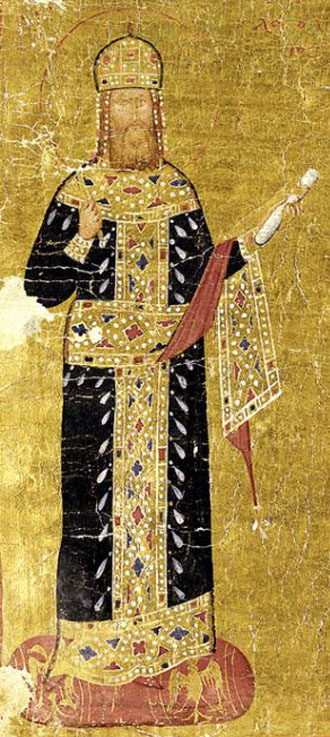
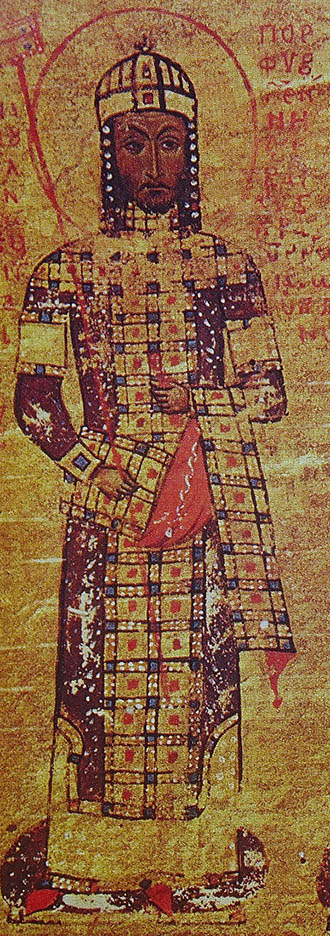
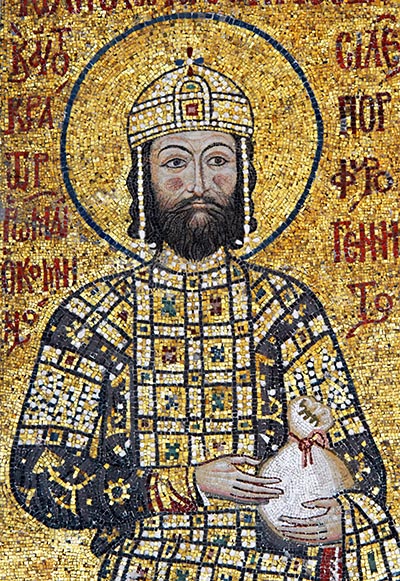
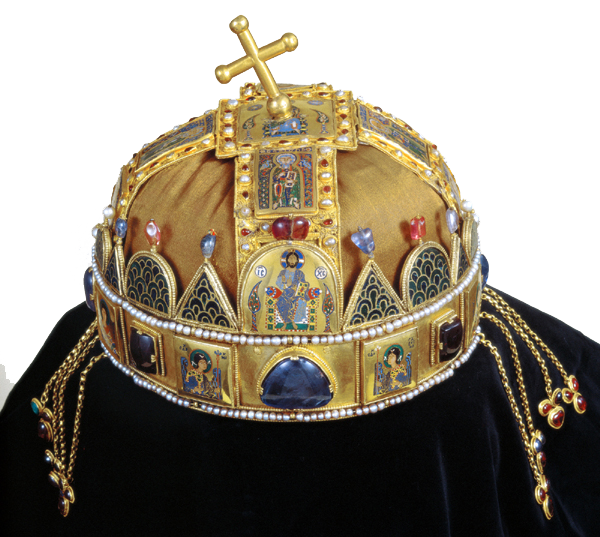
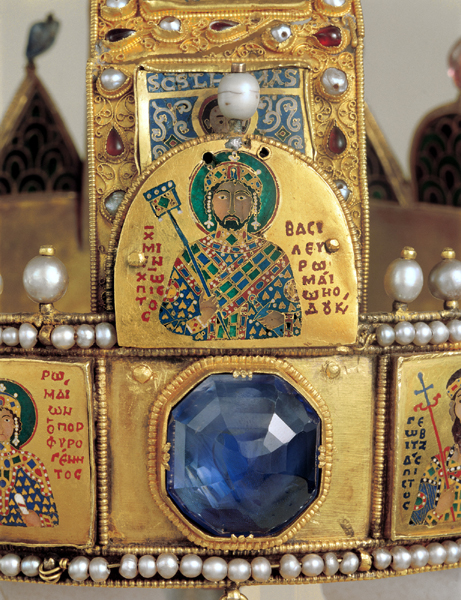
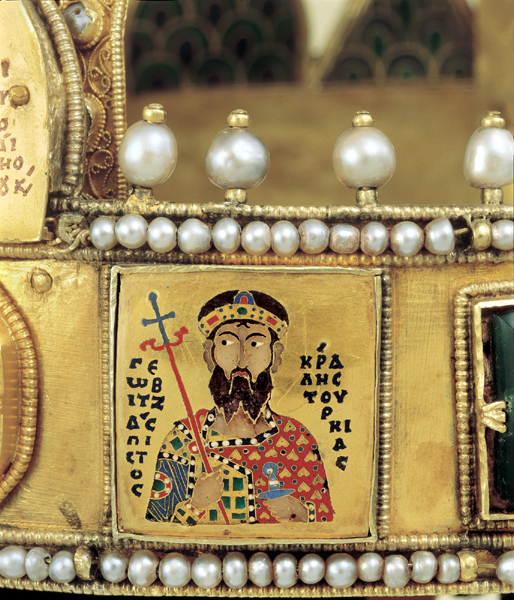
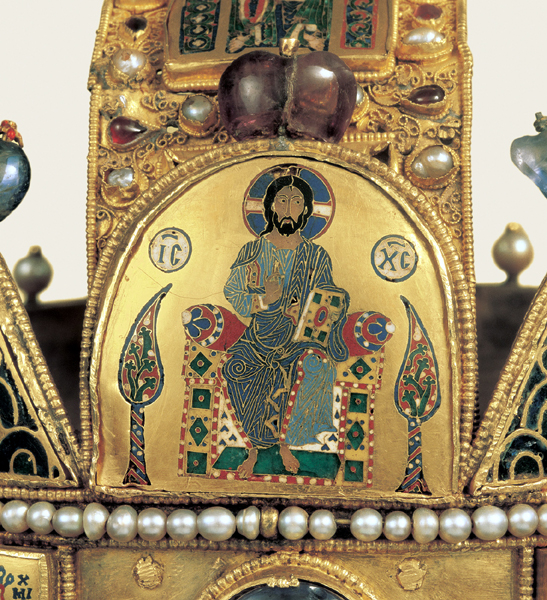
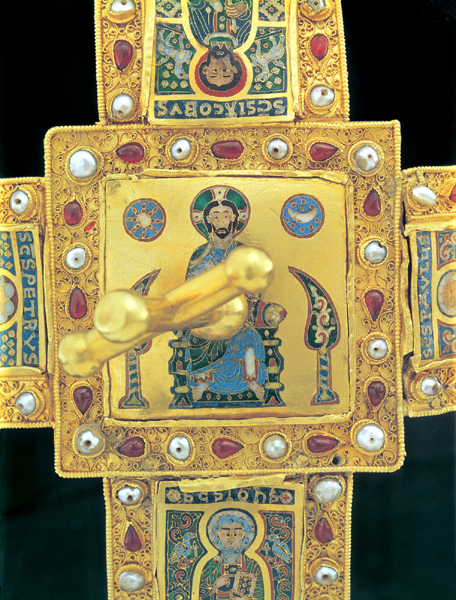
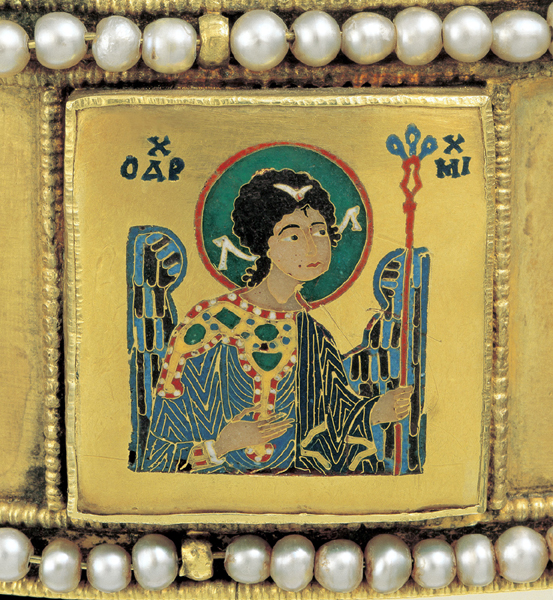
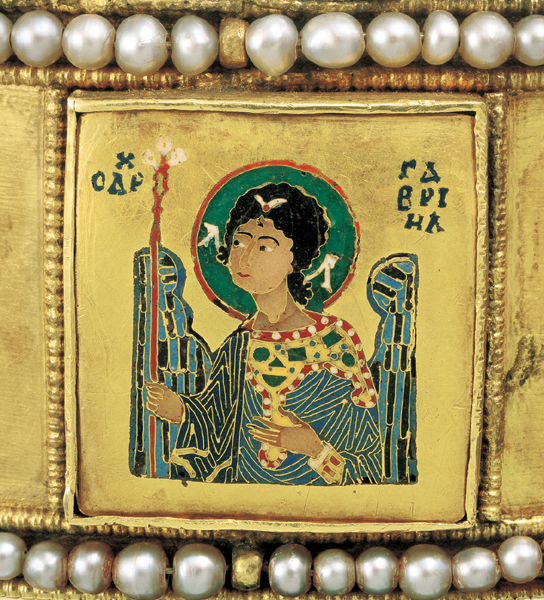
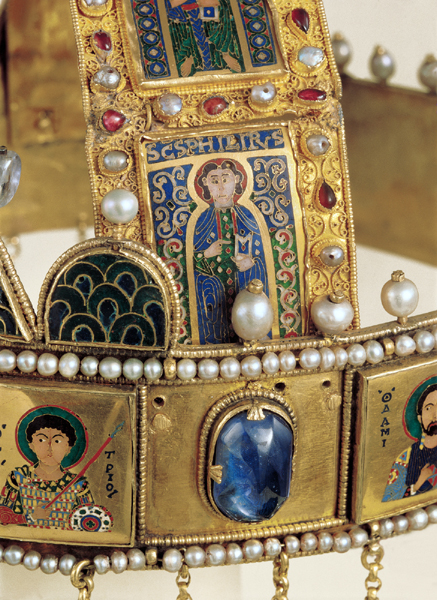
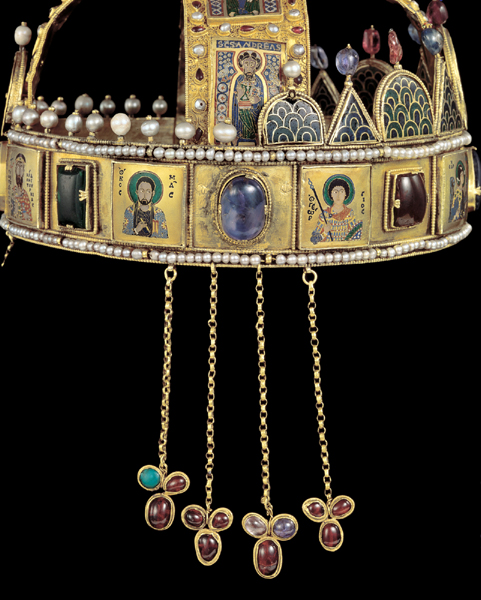
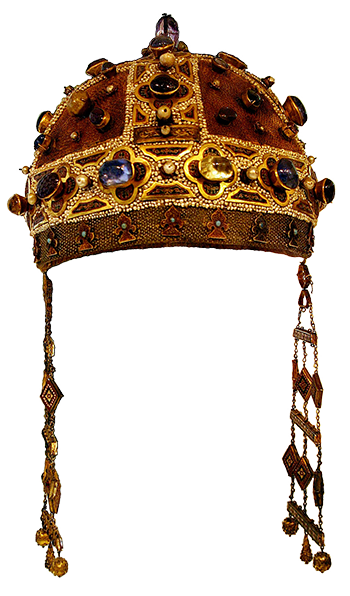
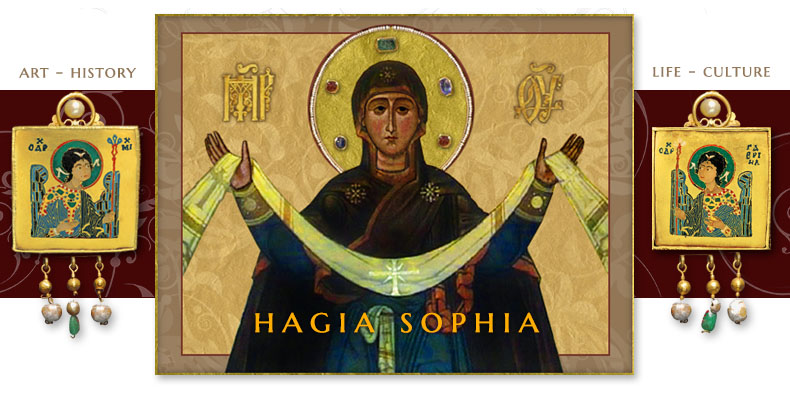
 Constantine’s wife, Helena, daughter of the patrician Alypius, is a mere cipher in the imperial records, and seems to have died much earlier, leaving three daughters—Eudocia, Zoe and Theodora—to grow up as they might in the palace of her voluptuous husband. Eudocia, the eldest, lost during an attack of smallpox whatever comeliness she may have had, and retired to hide her disfigured countenance under the veil of a nun. There remained Zoe and Theodora, and Constantine determined to marry one of the two to some important noble and leave the crown to him. The elder of the two was nearly fifty years old, and Theodora cannot have been much
Constantine’s wife, Helena, daughter of the patrician Alypius, is a mere cipher in the imperial records, and seems to have died much earlier, leaving three daughters—Eudocia, Zoe and Theodora—to grow up as they might in the palace of her voluptuous husband. Eudocia, the eldest, lost during an attack of smallpox whatever comeliness she may have had, and retired to hide her disfigured countenance under the veil of a nun. There remained Zoe and Theodora, and Constantine determined to marry one of the two to some important noble and leave the crown to him. The elder of the two was nearly fifty years old, and Theodora cannot have been much

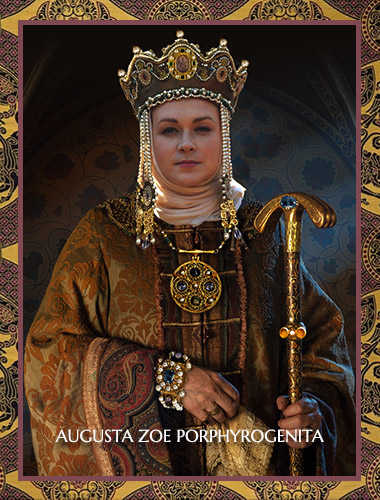

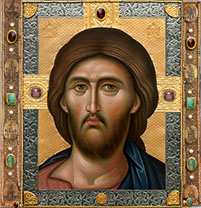 click here for icons of christ
click here for icons of christ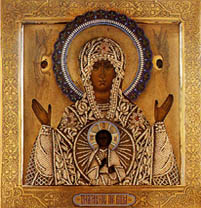 click here for icons of the theotokos
click here for icons of the theotokos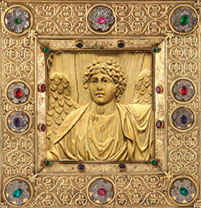 click here for icons of angels
click here for icons of angels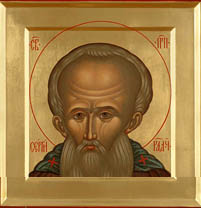 click here for icons of saints
click here for icons of saints








